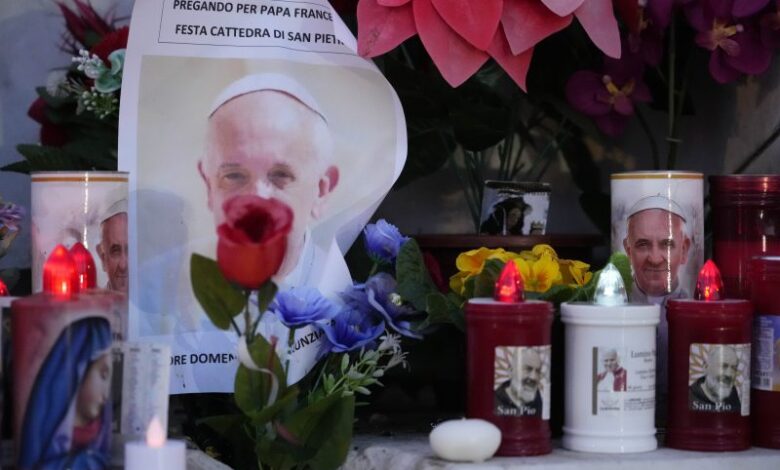Pope Francis remains in critical condition following respiratory crisis

Pope Francis Remains in Critical Condition with Complex Lung Infection
Pope Francis is currently in critical condition at the Gemelli Hospital in Rome, where he is being treated for a complex lung infection. The 88-year-old pope has been conscious but is receiving high flows of supplemental oxygen and blood transfusions as part of his treatment. His condition is being closely monitored by medical professionals, and further clinical tests are being conducted to assess his condition.
The Pope’s Health Crisis
On Saturday, Pope Francis experienced a severe respiratory crisis that required high levels of oxygen to help him breathe. He also received blood transfusions due to low platelet counts, which are essential for clotting. Doctors have described his prognosis as reserved, given his age, fragility, and pre-existing lung disease. The main concern is the possibility of sepsis, a serious infection of the blood that can occur as a complication of pneumonia.
Prayers and Support for Pope Francis
Despite his hospitalization, Pope Francis remains close to the hearts of many, with people around the world offering prayers and support for his recovery. Archbishop Rino Fisichella led a special Mass in St. Peter’s Basilica on Sunday in place of the Pope, offering a prayer for his health and well-being. Messages of support and well wishes have been pouring in from all corners, demonstrating the widespread concern for the Pope’s health.
Medical Updates and Treatment
Doctors have been monitoring Pope Francis’ condition closely, administering a combination of cortisone, antibiotics, and supplemental oxygen as needed. His recent hospitalization was the result of a viral, bacterial, and fungal respiratory tract infection that escalated into pneumonia. The medical team is taking all necessary measures to ensure his comfort and well-being during this challenging time.
Recent Reforms and Preparations
In recent years, Pope Francis has made several decisions indicating his awareness of his advancing age and declining health. Last year, he revised the funeral rites that will be observed after his death, simplifying the rituals to reflect his humble role as a bishop. He also created new cardinals and extended the terms of key figures in the College of Cardinals, signaling his preparations for a potential transition of power within the Catholic Church.
FAQs:
1. What is the main concern for Pope Francis’ health?
The main concern for Pope Francis’ health is the possibility of sepsis, a serious infection of the blood that can occur as a complication of pneumonia.
2. How are doctors treating Pope Francis’ condition?
Doctors are administering a combination of cortisone, antibiotics, and supplemental oxygen to treat Pope Francis’ complex lung infection.
3. What recent reforms has Pope Francis made in preparation for his declining health?
Pope Francis has revised funeral rites, created new cardinals, and extended the terms of key figures in the College of Cardinals to prepare for a potential transition of power within the Catholic Church.
4. How are people showing support for Pope Francis during his hospitalization?
People around the world are offering prayers and messages of support for Pope Francis as he undergoes treatment for his health condition.
5. What steps are being taken to monitor Pope Francis’ condition?
Medical professionals are conducting regular clinical tests and monitoring Pope Francis’ condition closely to ensure he receives the necessary care and treatment.



